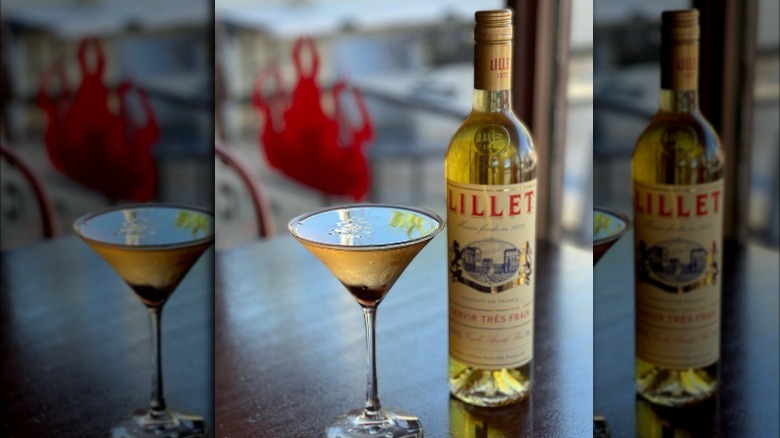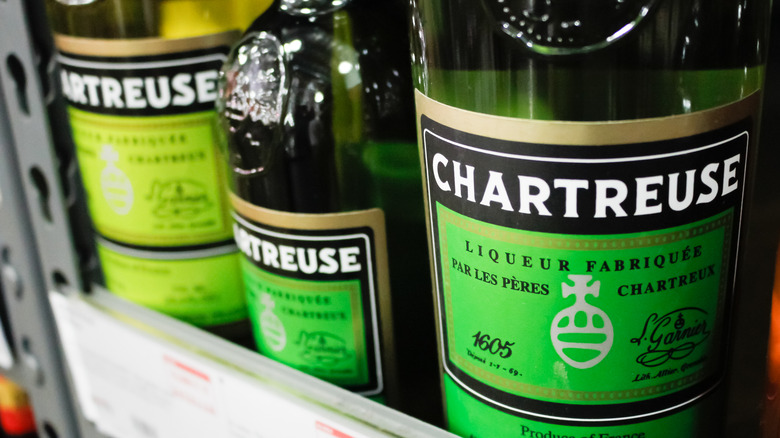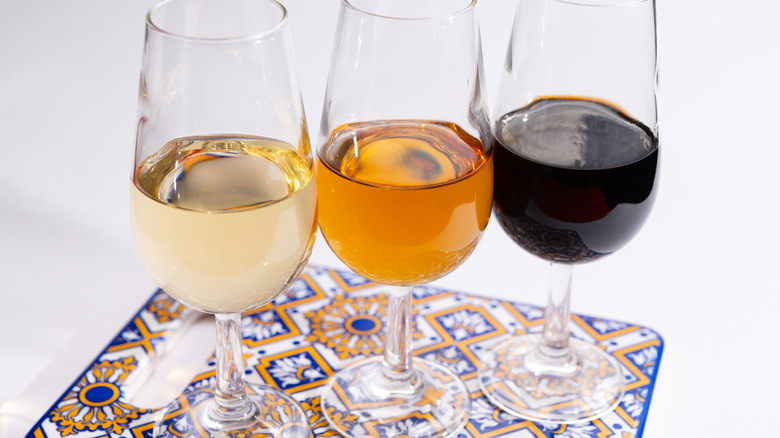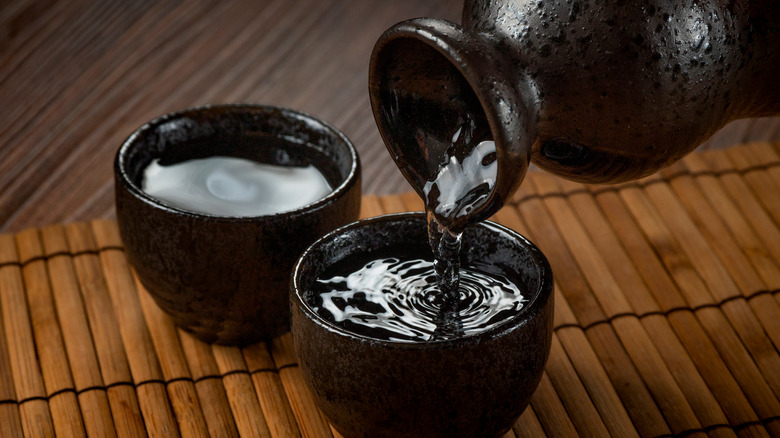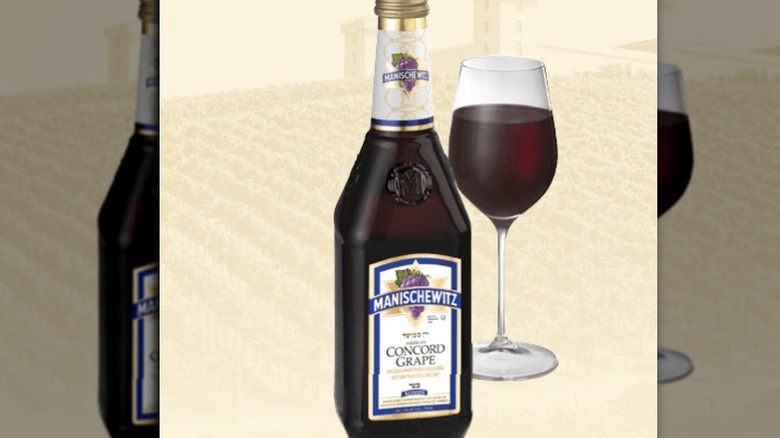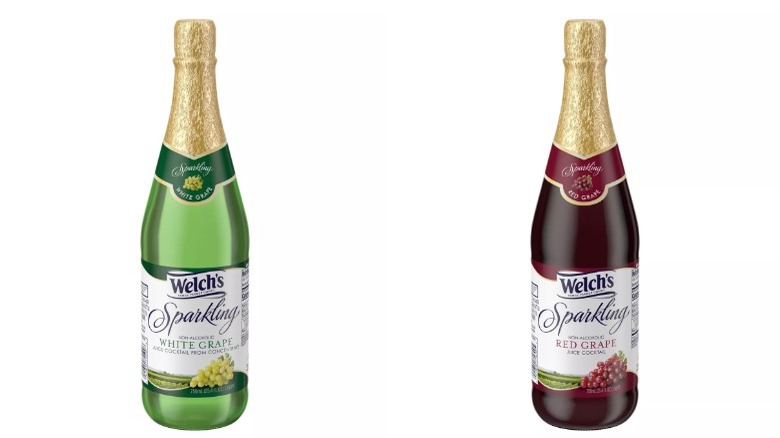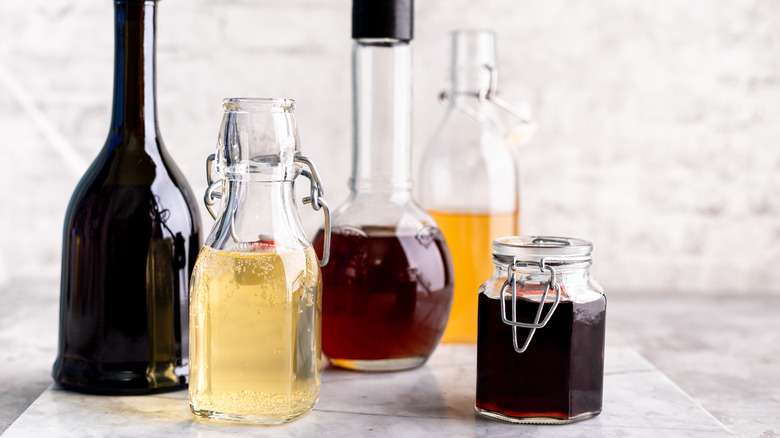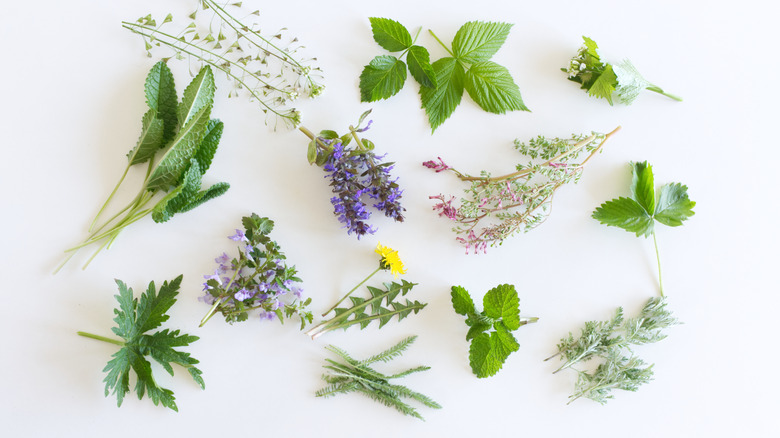11 Best Substitutes For Vermouth
We may receive a commission on purchases made from links.
Vermouth, known as an "aromatized wine," is infused with a mixture of botanicals including herbs, spices, barks, and dried berries and fruits. The botanicals will vary depending on where the vermouth was made and by whom, whether it's meant to be dry or sweet, and any specific flavor profile that the maker might be going for, such as earthy or fruity. Vermouth is also known as a "fortified wine," which means that it contains a distilled spirit, like brandy, which raises the alcohol content to between 15 and 20%.
Vermouth makes a wonderful cocktail all by itself or paired with an extra-large ice cube, but it's also an essential element in several classic cocktails including the Manhattan, the Negroni, and the classic martini. But vermouth can also be used in cooking, such as in Ina Garten's beef tenderloin recipe. So what happens when you need this specific ingredient, but don't have any on hand? Read on to learn about the best substitutes for vermouth.
1. Lillet Blanc
If you're looking to make a classic martini, whether with gin or vodka, but you seem to be out of dry vermouth, you can use always Lillet Blanc — if you have it on hand, that is. Lillet Blanc is the perfect substitute in any cocktail that calls for dry vermouth because it offers the same layered, aromatic flavors that vermouth does. In fact, it's worth noting that vermouth happens to be a well-known and well-accepted substitute for Lillet Blanc (via FOOD CHAMPS).
Before you go ahead and make that substitution, do keep in mind that Lillet Blanc tends to have a bit more citrus in its flavor profile than vermouth does. If that makes the use of Lillet Blanc less appealing to you, on the Lillet website there is a recipe for a martini that minimizes the focus on the citrus and emphasizes the botanicals. It calls for three parts Lillet Blanc, one part vodka, and one-half part gin. This particular recipe aside, as a general rule, you'll want to substitute Lillet Blanc for vermouth on a 1:1 ratio.
2. Chartreuse liqueur
Chartreuse is a luxury French herbal liqueur with a secret recipe involving over 100 different botanicals. The formulation includes some quantity of "thujone," the active chemical in wormwood which is the substance that has made absinthe controversial in the past (per Food Republic).
Chartreuse comes in two varieties, one of which is yellow, the other green. Both work as substitutes for vermouth, but LIQUOR.com offers a tempting martini recipe that uses yellow Chartreuse and offers a useful template for how to use Chartreuse as a substitute for vermouth in general.
The recipe, "Alaska," uses equal parts yellow Chartreuse and a high-quality gin, which one can expect will be rich in botanical tones, along with a dash of orange bitters and a squeeze of lemon peel. The orange and lemon deliver a hint of citrus to offset the double whammy of botanicals you get from mixing Chartreuse and a complex gin. At the same time, the bitters and lemon peel take down any sweetness that may come from the Chartreuse. When using this as a substitute for vermouth in cocktails or cooking, you can use it in equal parts, or a 1:1 ratio. As with the "Alaska," you can use a bit more Chartreuse than you would use if you were using vermouth. Start with a 1:1 ratio and add more to taste.
3. Dry Sherry
"Dry Sherry is about as close as you can get [to vermouth]," claims Jacques Bezuidenhout of Liquid Productions (via The Alcohol Professor). One reason is that sherry, like vermouth, is considered a fortified wine. In the case of sherry, the wine base is fortified with a distilled spirit made from grapes. Like vermouth, sherry, which is produced mostly from the "Palomino" grape, comes in both sweet and dry varieties.
Some dry sherries are specifically for cooking, as in "cooking sherry." This isn't sherry that you would want to drink, as it's been enhanced with salt and preservatives. This sherry wouldn't be the proper choice if you're looking for a vermouth substitute in a cocktail, but it's great for food recipes. It works particularly well in recipes for meat, fish, and risotto.
Other sherries make a great substitute in dessert recipes that call for vermouth, but be careful that the chosen sherry isn't too sweet. It's recommended that you taste it before making the substitution.
When using dry sherry as a substitute for vermouth, you can use it in equal parts, or a 1:1 ratio, but as noted above, be sure to taste it first to test its sweetness.
4. White wine
Wine is where vermouth begins and it happens to be one of the best substitutes for vermouth in cooking. There are many varieties of white wine with different flavors, including citrus and fruit. Which white wine to use in place of vermouth depends on the dish you're creating. A dry white wine, for example, would be substituted for a recipe calling for dry vermouth.
For dishes calling for sweet vermouth, a sweet white wine, such as a reisling, is a perfect alternative for vermouth when you're after "the sweetness of vermouth without the strong taste of alcohol," according to Tastessence. The only real catch is that in addition to having a lower alcohol content than vermouth, white wine is going to deliver a less layered, herbaceous flavor. If you're creatively inclined, you can consider adding some of your own botanicals, such as thyme, basil, or rosemary into the recipe to see if you can make up for vermouth's more herbaceous notes.
According to Foods Gal, you can substitute white wine for vermouth in cooking recipes on a 1:1 ratio, and this would appear to make sense for cocktails as well.
5. Sake
Sake, whose origins are Japanese, is a wine made from rice. Although sake is not fortified or aromatic, its clean, fruity, and sometimes nutty flavor is comparable to that of vermouth. Sake works as a substitute for cocktails that call for either sweet or dry vermouth. It can be swapped out in a martini on a 1:1 ratio, per Tastessence, but the precise ideal ratio of vermouth to gin (or vodka) is perpetually up for debate, so the publication recommends using one part sake to three parts gin. Of course, you can play with the proportions of vermouth and gin in a martini to perfect the desired taste.
In addition, sake can be used in place of vermouth in both cooking and baking, but the sake should be simmered with the food to bring out all the flavors of the recipe. Sake, like other wines, can be used in place of vermouth on an equal basis, or 1:1 ratio.
6. Port
Port is a fortified wine that was first made in Portugal. Unlike vermouth, port is not aromatized but it works well as a substitute for vermouth in both cooking and cocktails, thanks to its multilayered flavor. In addition, LIQUOR.com notes that substituting port for vermouth also has the effect of reducing the alcohol content slightly.
It is worth noting, however, that port is sweet. So it's best for replacing sweet vermouth in cocktails, according to Cuisinevault. This makes it an ideal substitute — on a 1:1 basis for vermouth in such cocktails as the Manhattan and the Negroni. This is particularly true for red port, which will lend sweet vermouth's familiar blush to these cocktails. However, white port can also be used. And if you can't find port, Madeira also makes an excellent substitute. When cooking with port as a substitute for vermouth, you can also follow the 1:1 rule.
7. Manischewitz Concord Grape
Red wine, like white wine, is where some fortified wines such as port begin, which means it is neither aromatized nor fortified. However, red wine can make an excellent substitute for vermouth in cocktails and in cooking. A dry red wine will work in cocktails calling for dry vermouth. It will also work in recipes calling for sweet vermouth, as long as you add a dash of simple syrup. Regular sugar also works if you don't have, or feel like, whipping up a batch of simple syrup.
Adam Teeter of VinePair advocates the use of Manischewitz, that is, "if you happen to have that lying around." Manischewitz's most popular wine is the Concord Grape, which is revered for its fruity sweetness. Now, truth be told, not everyone is a fan of Manischewitz, the taste of which the Jewish blogger behind Brokelyn described as: "Welch's Grape Juice meets Port meets the blood of our forefathers." But, that doesn't mean this iconic wine doesn't work beautifully as a vermouth substitute in cocktails, not to mention cooking.
As with other wines, you can use a 1:1 ratio when substituting for vermouth.
8. Grape Juice
Grape juice as a substitute for vermouth? Yeah, we did — and we feel your side-eye. In fact, we were kind of surprised to learn that this kid-approved drink turns out to be an alternative for the fortified wine that is vermouth, despite its zero alcohol content and not a hint of botanical flavor or aroma. Yet, grape juice works as a substitute for vermouth, at least when it comes to food recipes. We can't say whether grape juice makes a good substitute mixer for a cocktail, but you're certainly welcome to try.
Like vermouth, grape juice can be either sweet or dry and rich or light in color or depending on how it's made. If your recipe calls for dry vermouth, try adding a bit of salt or lemon juice to the grape juice to lend a "light and fresh flavor." Furthermore, in any recipe calling for vermouth, Tastessence points out that you should start with half the amount of grape juice. You can always add more.
9. Olive brine
Now that we've opened the door to non-alcohol-based substitutes for vermouth, we need to talk about olive brine as a substitute for vermouth in martini cocktails — but especially in dirty martinis. According to Substitute Cooking, a "light spritz" of olive juice works just as well as vermouth does in a dirty martini.
Not everyone, however, will agree that olive brine can substitute for vermouth in a martini. "There are some people who simply use olive brine and call it a 'dry' Martini, but what you're drinking then is just chilled and salty vodka or gin," according to Adam Teeter of VinePair. It works, Teeter concedes but notes that it's not then considered an actual martini.
And while olive brine has the flavor and the tang that you may be looking for in a martini, can you drink it on its own the way you can Vermouth? That's simply a matter of preference.
To use olive brine as a substitute for vermouth in cocktails, start by using only half as much, and adjust according to taste.
10. Vinegar
Vinegar, especially those that are made from wine, makes a good substitute for vermouth. Tastessence recommends using one cup of vinegar plus ⅔ cup of water for every cup of vermouth called for in a recipe. This helps to take down the acidity of the vinegar. White wine vinegar should be used where dry vermouth is called for, and red wine should be used in place of sweet vermouth. That being said, red wine vinegar can also be used as a substitute for dry vermouth in cooking, just be aware that it will give your finished product a blushed tint. Another vinegar that can be used in place of vermouth is balsamic, but since that tends to be sweet, it's best used to replace sweet vermouth in recipes. Apple cider vinegar also works as a vermouth substitute in cooking.
When cooking with vinegar as a substitute for vermouth, use equal parts, a 1:1 ratio.
11. Make your own vermouth
If you're out of vermouth, and none of the mentioned substitutes above seem appealing to you, have no fear — you can make your own vermouth! According to ART OF DRINK, to make your own vermouth start by selecting a wine that you're willing to experiment with. From there, you'll "fortify" the wine with a distilled spirit. Brandy is a good option, as is Eau d' vie, which is a colorless brandy, so it makes a good choice when making a similar vermouth substitute.
The next step is to "aromatize" the wine with herbs and other botanicals that appeal to you. These can include basil, mint, thyme, and lavender, as well as spices such as cloves, cardamom, and fennel seeds. You can also include orange or lemon peels and dried juniper berries. If you're going for sweeter vermouth, you'll want to include some sugar, honey, or maple syrup. Your homemade aromatizing can be accomplished by either steeping the botanicals directly in the wine at room temperature, or by boiling a portion of the wine with the botanicals, letting the mixture cool, and then adding it back into the rest of the wine. As the saying goes — "enjoy responsibly!"

